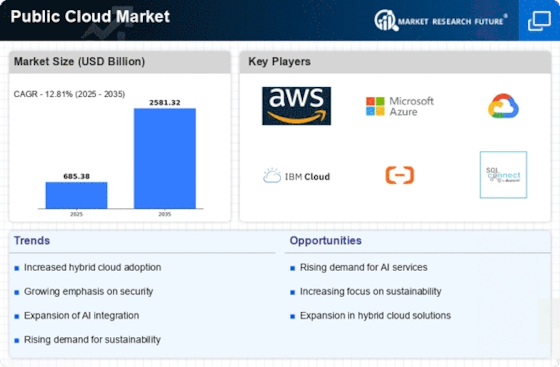Top Industry Leaders in the Public Cloud Market

*Disclaimer: List of key companies in no particular order
Competitive Landscape of Public Cloud Market
The public cloud market continues its relentless ascent. This stratospheric growth attracts an ever-expanding roster of players, each vying for a slice of the digital pie. Understanding the dynamics at play demands a clear examination of the competitive landscape, encompassing established giants, nimble new entrants, and the strategies shaping their trajectories.
Some of the public cloud companies listed below:
- International Business Machines Corporation
- Amazon.com, Inc.
- Microsoft Corporation
- Hewlett- Packard
- Salesforce.com
- Oracle Corporation
- VMware, Inc.
- Cisco Systems, Inc.
- Verizon Wireless
- Rackspace Inc.
Strategies adopted by Key Players:
- Continuous Innovation: They invest heavily in research and development, constantly expanding their service portfolios with cutting-edge technologies like AI, machine learning, and serverless computing.
- Global Expansion: They aggressively build data centers across the globe, catering to regional regulations and latency concerns.
- Partnerships and Acquisitions: They forge strategic partnerships with technology providers and acquire promising startups to bolster their offerings and reach new markets.
- Pricing Flexibility: They offer a range of pricing models, from pay-as-you-go to reserved instances and enterprise discounts, catering to diverse customer needs.
Factors Shaping Market Share Analysis:
- Service Breadth and Depth: The breadth of available services and their depth of functionality play a crucial role. Extensive compute, storage, networking, and database offerings coupled with advanced artificial intelligence, machine learning, and analytics tools attract diverse customer segments.
- Pricing Strategies: Flexible pricing models like pay-as-you-go or reserved instances cater to various needs and budgets. Competitive pricing can be a game-changer for cost-sensitive customers.
- Regional Presence and Partnerships: Strong regional footprints and strategic partnerships with local players grant access to specific markets and enhance brand recognition.
- Security and Compliance: Ensuring data security and compliance with regulations is paramount, particularly for industries with strict data privacy requirements. Robust security frameworks and compliance certifications build trust and attract customers.
- Innovation and Differentiators: Continuous innovation in areas like artificial intelligence, containerization, and serverless computing differentiates players and caters to emerging needs.
New and Emerging Companies:
The public cloud market constantly welcomes new entrants with innovative capabilities. Startups like Snowflake, Databricks, and MongoDB bring specialized cloud-native solutions for data warehousing, analytics, and database management, respectively. These niche players challenge established players by offering best-in-class solutions for specific tasks.
Latest Company Updates:
IBM introduced IBM Hybrid Cloud Mesh in 2023. This SaaS solution aims to help businesses manage their hybrid multicloud architecture. Modern businesses can operate their infrastructure across hybrid multicloud and heterogeneous environments thanks to IBM Hybrid Cloud Mesh, which is powered by "Application-Centric Connectivity" and designed to automate the process, management, and observability of application connectivity in and between public and private clouds.
Oracle Corp. today announced the launch of a dedicated cloud infrastructure in 2023 that will only be used by the 27 EU member countries. This infrastructure will offer the same services, service-level agreements, and pricing as Oracle's larger public cloud.
The EU Sovereign Cloud, which launches in July, is wholly housed inside the EU, maintained by EU-based staff, and run by Oracle-owned legal companies with EU incorporation. It is initially accessible via data centres in Frankfurt and Madrid, while additional locations might be added later.
In order to assist businesses in making the most of their cloud spending as they continue to deal with macroeconomic uncertainties, Google Cloud released a Pricing API for its cloud services in 2023. The new API, which is now in public preview, outperforms Google's current Billing Catalogue API, according to the business.
As business goes more and more to the cloud in 2023, firms will need to strengthen their defences against increasingly sophisticated malware attacks. They can with SentinelOne. Threat Detection for Amazon S3 and Threat Detection for NetApp are the first two products in the new Cloud Data Security product line, which was launched today by the world leader in autonomous cybersecurity. These tools are made to assist businesses employing NetApp file storage and Amazon S3 object storage in identifying and stopping the spread of malware throughout their corporate networks and cloud environments.









